It is important to navigate comfortably on the fretboard for a guitarist. There can be many notes to learn, considering that a standard six-string guitar has four octaves of 12 notes each. That can be a lot to remember, but do you need to memorize all of them?
Most guitarists don’t memorize the entire fretboard. Instead, they learn key points on the fretboard and how to adjust the notes to the pitch when needed. Some professionals, like jazz guitarists, learn all the notes on the entire fretboard to help them perform, as they need to use complex arrangements and scales. Also, for composers, it is a big plus if they know all the notes, which can help them significantly on the way.
In this article, I’ll cover why most guitarists don’t memorize the entire fretboard. I’ll also go over why learning as much of the fretboard as possible is still a good idea to improve your playing. Here’s what you need to know.
Why Most Guitarists Don’t Memorize the Entire Fretboard
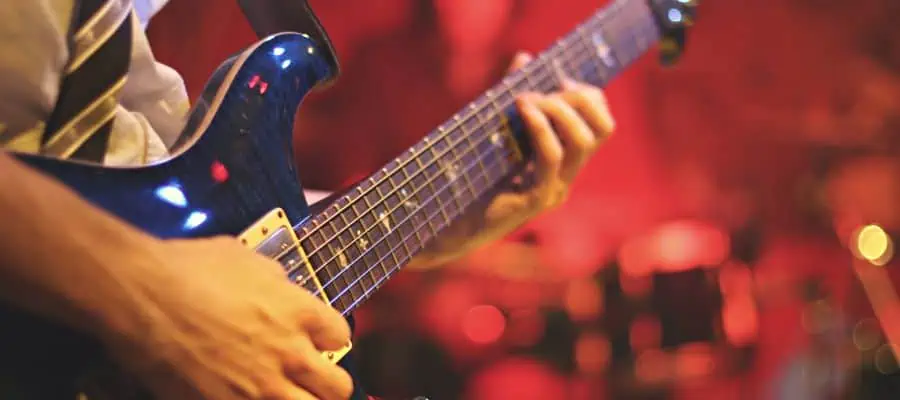
Most guitarists won’t memorize the entire fretboard because they don’t need to. Because of how guitars work, you can learn to play well without memorizing the whole fretboard from top to bottom.
It’s also tedious to memorize and can discourage new players from practicing. If you’re new to guitar, you’ll want to start by learning the notes in the key you like to play first. Once you have those down, you’ll feel more confident playing and have more experience learning the rest of the fretboard.
You don’t need to learn it all at once, so it’s best to break it into chunks. Most guitarists learn the notes they need to know first, then branch out if they need to for a new song. Many guitarists are self-taught, so they don’t focus on memorizing the whole board before learning more.
Most guitarists learn where specific notes are on the fretboard to use as a reference point. From there, they know where to put their fingers to play other notes on that scale. While they may have yet to memorize the entire fretboard, they still can play well with this method—many people like this for a long time before learning the whole board by heart.
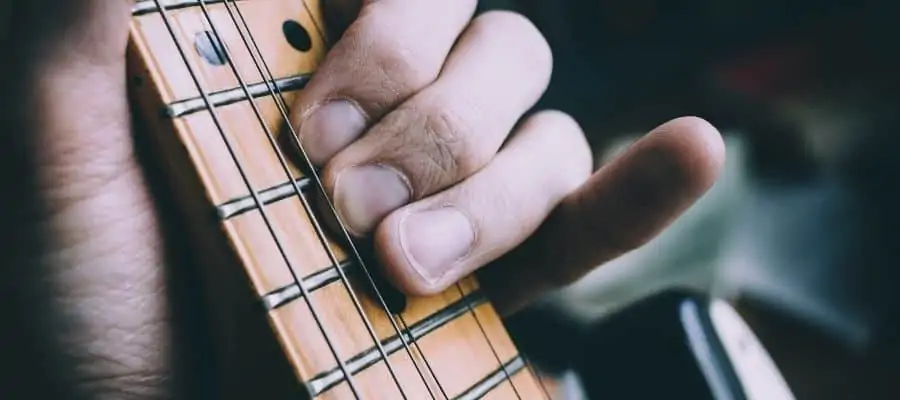
There are many different approaches to use the fretboard efficiently, like the CAGED system. The CAGED system does not necessarily teach you the names of the notes. Still, it shows you the relations of different scale positions on the fretboard, as well as fingering patterns you can use to create melodies, chord arrangements, and licks to create your music.
The most important thing to know is the root, the third, and the fifth. With the CAGED system, you learn where all the necessary notes are for a key to play and improvise. You can get the job done in any key without knowing a single note name, as you know the patterns and where all the important points are located.
There is also the approach of the triads. The triads are the most basic three-note chords to learn on the fretboard. There are many different triads of the same chord in different positions and strings. Learning those triad patterns helps you memorize where the root, the third, and the fifth of a note are located. This way, you can learn the patterns, adjust them to any key without any effort to learn all the notes on the fretboard and create your solos and riffs.
That said, memorizing the fretboard isn’t a bad thing. You can easily improvise during songs if you know where all the notes are. However, it does take a long time, and there’s no rush to do it. You should focus on learning and remembering the notes at your own pace so you don’t get frustrated with playing.
Most guitarists don’t memorize the entire fretboard since they’re self-taught or only play in a casual setting. Those who learn it usually aim to play professionally or want to write music. You should work on learning the fretboard if you plan on improvising or becoming a pro.
Should I Memorize the Whole Fretboard?
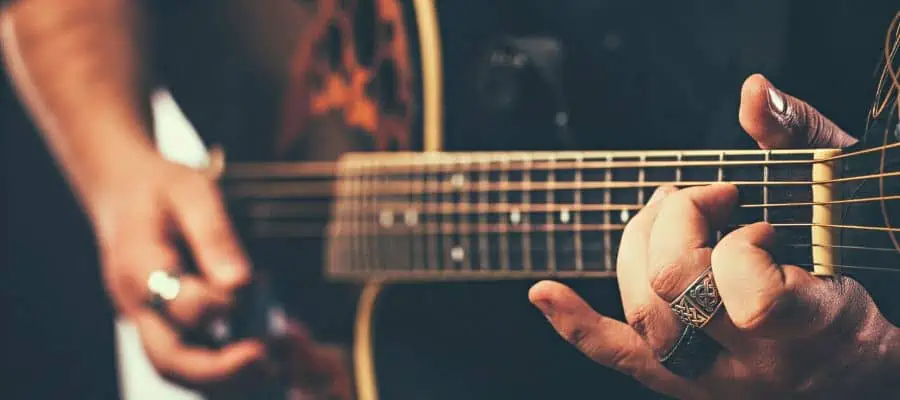
Whether you memorize the entire fretboard is entirely up to you. Many people can play just fine without remembering it, but doing so has many benefits. However, learning only some of the notes could hold you back as a guitarist.
That being said, you should memorize the whole fretboard if you’re serious about becoming a musician and composer. Knowing the fretboard will help you understand music better and give you more freedom when improvising and composing. You’ll know what notes sound good together and how to create different licks and partitions to improvise deeper during performances or use different harmonies to make your riffs and licks more interesting.
So, if you want to make improvising on the fly easier, it’s best to learn as much about the fretboard as you can. Those who know the whole fretboard can improvise licks in a song without the notes clashing. You’ll also better understand music theory, allowing you to write your own music.
For instance, genres that require a high level of improvisation and musical theory, like jazz, are almost only possible to play by learning the notes on the fretboard. You will need to use almost every note on the fretboard for a complex jazz solo, so you must have a high level of music theory knowledge and fretboard mastery to apply it to the instrument.
In general, the pros are the ones who need to memorize the fretboard. However, if you’re serious about playing the guitar and want to improve your skills and understanding of music, you should take the time to memorize it, too.
How Long Will It Take To Memorize a Fretboard?
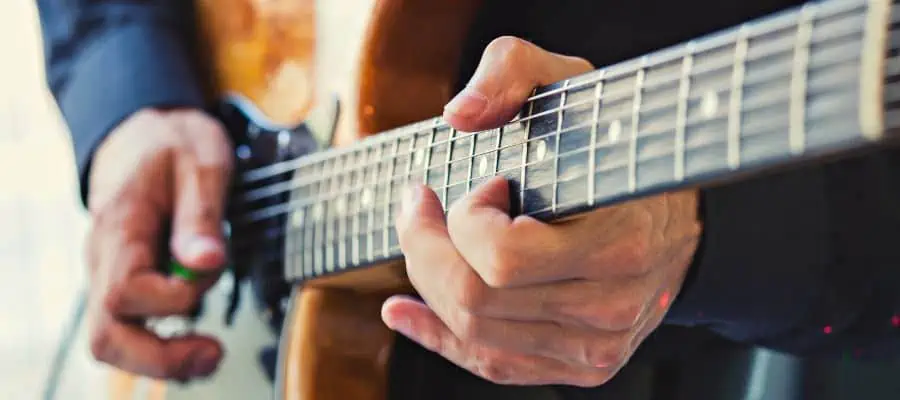
You might be surprised that memorizing a fretboard doesn’t take as long as you think. The more experience you have with playing your guitar, the less time it takes.
While the duration can vary from person to person, generally, it takes about two months to memorize the entire fretboard. It depends on how much time you dedicate to learning. Start by learning one string at a time, then learn one note at a time—for example, practice memorizing where the C note is on every string.
Using that method, you can quickly learn the fretboard. If it does take you longer, don’t feel discouraged! We have different ways of memorizing things, so you must devise a unique practice routine.
Learning one string first can help you out a lot. It’s straightforward and sets you up to learn the entire fretboard easily. The high and low E strings use the same fingerings, making them the easiest to learn. From there, you’ll want to memorize each note. You’ll notice patterns and start building a muscle memory at this stage.
If you can set aside at least half an hour a day to practice like this, you can memorize the fretboard in just a few months. The more you practice, the faster you’ll learn it. Soon, you’ll have a working memory of the notes, so you don’t need to pause and think to find them.
This process can feel daunting to new players and discourage them from learning the guitar. If you start to feel this way, it’s okay to take a break and go back to practicing your favorite songs for a while.
Tips To Memorize The Entire Fretboard
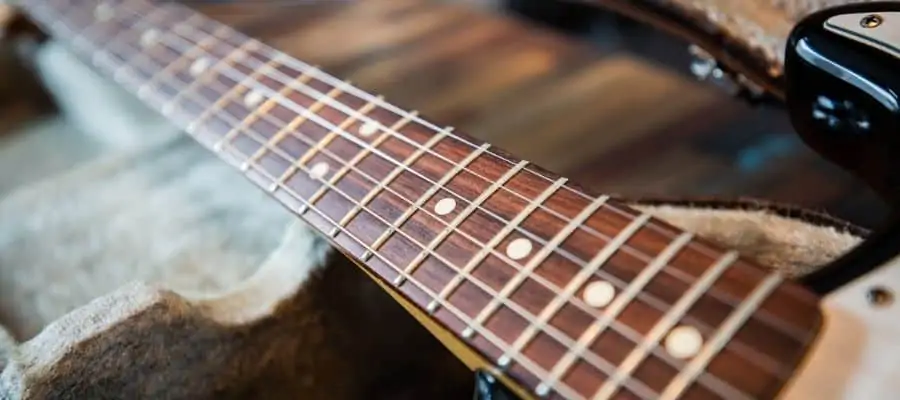
- Start by learning one string. After you are comfortable with it, go to the second one.
- Remove the chromatic notes and try to learn all the notes on a string: CDEFGAB.
- Start slowly. Don’t rush and let the note names sink into your memory.
- Focus on visualizing the note names when you play.
- Pick a note and try to play the same note on the entire fretboard in all strings.
- Put a poster in your room or a picture on your smart device with the notes on the fretboard to study and memorize the notes when you are not playing.
Final Thoughts
In short, most guitarists don’t learn the whole fretboard. Most professionals do, however. It has many benefits, including allowing for more improvising and writing your music, so I recommend you learn it. There’s no rush, so you can memorize it at your own pace to avoid burnout.
While most guitarists don’t memorize the entire fretboard, the best ones do. So, if you’re serious about learning guitar, set aside time to practice memorization daily. It doesn’t take as long as you think when you’re consistent.
If you found this article useful, you may want to save this pin below to your Guitar board.

Recent Posts
When learning new songs have you noticed that some of the chord sequences sound really good? But when you tried to come up with your own chord sequence, or as we call it chord progression, you found...
Some guitarists insist on buying an expensive amplifier with their electric guitar. They assume that this is a must for every type of guitarist out there. However, in some situations, this isn’t...

